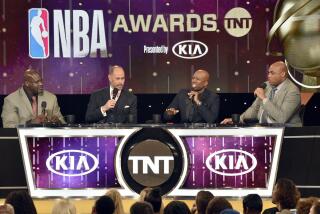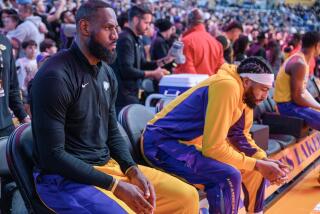Cleverly, Lakers Get Job Done
In Los Angeles, the land of high-priced real estate, it is all about location, location and location.
For L.A. Laker fans, there is no more valuable piece of real estate than five feet from the basket, with the ball in Shaquille O’Neal’s hands.
So the Lakers, and their coach, Phil Jackson, finally closed escrow on the Sacramento Kings on Sunday by creating clever ways to get O’Neal to the spot, get him the ball and make sure that he was able to establish, beyond anyone’s doubt, that this was his domicile.
The Lakers got the ball in to O’Neal in a variety of ways:
* With the pick and roll;
* By swinging it from side to side and entering in to O’Neal from the second, or even, third side;
* By starting him up high, then having him hand off and dive low for the return pass.
The Lakers were creative and patient, especially in the second half. This way, they beat the Shaq Pack, the Sacramento collapse that had Vlade Divac behind him, Chris Webber in front and everybody else close by collapsing. Part of it is making sure that you stretch the defense, and every time Robert Horry made a three-pointer or even Derek Fisher sank one at the end, the Shaq Pack has to stop packing so much and stretch out to go get the shooters.
With O’Neal moving constantly to that valuable piece of real estate, the Lakers, once they settled down and got patient and used more of the clock, would pass the ball in, get it back out and then pass it in immediately. There would be a passing cadence, almost like a dance step. Like this: In, back out, back in. In, back out, back in. Then, when that started to be defended, the cadence would change to: in, back out, swing to the other side, in, back out, in.
This was a series that left both teams breathless, not to mention the fans of both teams. It was a series that tested both coaches, and both clearly passed.
Rick Adelman did his best to get the Lakers to play too fast, out of their tempo. And he got great results from his picking and rolling and two-man games, all triggered by Mike Bibby, who came of age in this seven-game endurance test. I was especially impressed that Adelman did not play the Peja Stojakovic card, that he did not make the injury to a key player an issue, or an excuse.
Jackson countered and adjusted nicely every game. He never let his team get caught up too long in Sacramento fastball. And, at moments, like the one Sunday in the timeout where he yelled at Horry, Jackson was really the Zen Master. He was angry at O’Neal, so he yelled at Horry, who yelled back. The message was passed, although not directly to the person needing to receive it. But think about it. Would you yell at O’Neal? Would any sane person?
Here is perhaps a key difference, or maybe THE key difference, in this series. O’Neal is a franchise player who is the fulcrum of his team, who passes when appropriate but looks to shoot every time it is needed. Webber is a designated franchise player, who is paid to be one and expected to do what one does, but one who looks to pass before he looks to shoot and who is content with sharing the ball, rather than scoring at the key moments. NBC’s Peter Vescey calls him the “Fake Franchise Player,” which may be a bit harsh.
This was a series of ifs, ands and buts. Let’s toy with the order.
“If” Stojakovic were healthy throughout ...
“But” for horrible free-throw shooting by Sacramento in Game 7 ...
“And” despite all the cow bells and close games and talk about dynasties ending, the Lakers are still the Kings.
*
Rick Majerus, Utah basketball coach, will be The Times’ guest analyst on the Lakers for the rest of the playoffs. Majerus, the fourth-winningest active coach in major college basketball, will begin his 14th season at Utah this fall.
More to Read
All things Lakers, all the time.
Get all the Lakers news you need in Dan Woike's weekly newsletter.
You may occasionally receive promotional content from the Los Angeles Times.






